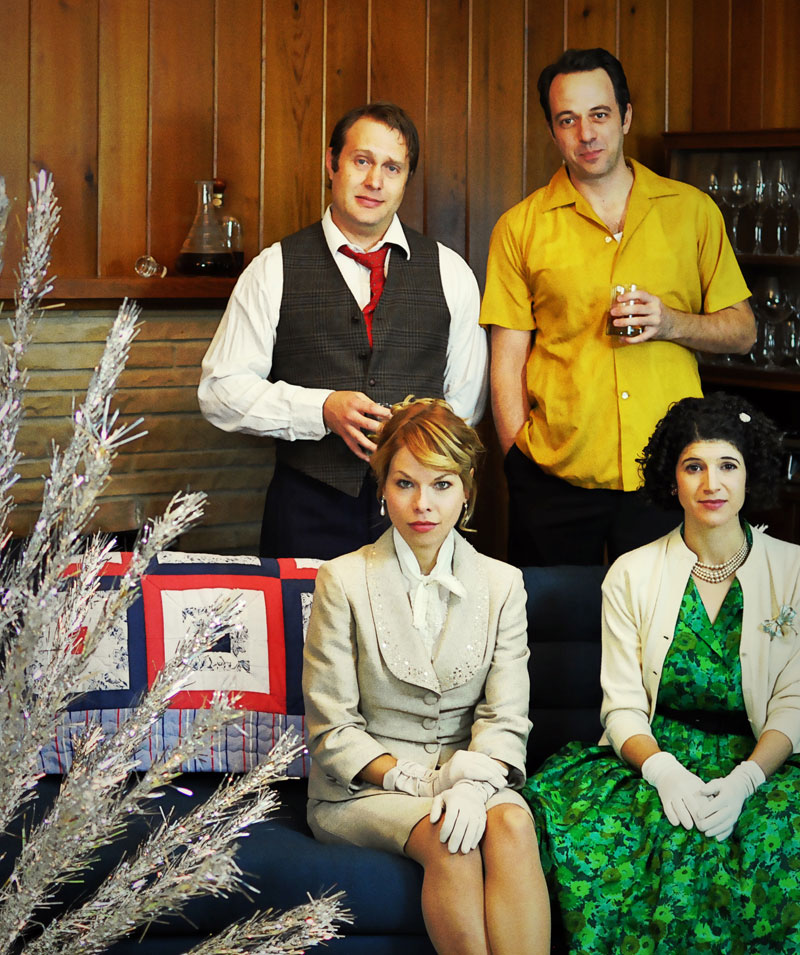
Cast members Bryce Kemph (George), Madeleine James (Isabel), David Mason (Ralph) and Elizabeth France (Dorothea) star in TheatreSquared’s Period of Adjustment.
Photo: Bettencourt Chase Photography
“Period of Adjustment,” a Tennessee Williams comedy (believe it or not), is the rich and attentive snapshot of two couples in marital crisis. One has been wed for a day; the other finds their marriage at its breaking point after years of wedlock. Williams, the playwright of “Glass Menagerie” and “Cat on a Hot Tin Roof,” isn’t particularly known for his comedy – his work is usually laced with psychological darkness and piercing betrayals.
Glowing in the hands of director Sean Patrick Reilly, however, TheatreSquared has unearthed a laugh-out-loud gem.
All of the earmarks of the Pulitzer prize-winning playwright are there, but with a slightly lighter mood and a much brighter ending. But really, this should take no fan by surprise. When Williams published his “Memoirs,” he originally called it “Flee, Flee. This Sad Hotel” (a title he cribbed from an Anne Sexton poem). He changed it because, in his words, “my life is as much a merry tavern as a sad hotel…My God, I’ve gotten a lot of laughs out of life.”
Though “Period of Adjustment” certainly has its sad hotel moments, there is a hope in it that I found refreshing, even believable. The rest of T2’s season notwithstanding, this may be their must-see play of the year.
The first act opens with bride of a day, Isabel, (Madeleine James) left on the doorstep of war hero, Ralph Bates, (David Mason) by her apparently fled new husband. The doorstep and the house beyond is as much a success as the sensitive performance that follows. Alan Schwanke’s set is stunning – a truly absorbing masterpiece of architectural complexity and period detail. I was lost in this world, in part, because it was so complete in appearance.
James handles the jittery young Texan, Isabel, with a querulous precision. Her anxious edge is softened nicely by Mason’s more casual performance. Reilly puts the magic of the set to great use as the characters move through the house with the natural (or unnatural) ease of host and houseguests. When her husband, George, (Bryce Kemph) returns to reclaim his abandoned bride, the negotiations between what is love and what is lost really become the thing.
Though only appearing in about a fourth of the production, Elizabeth France’s Dorothea (Mrs. Ralph Bates) more than pulls her weight with a studied yet effortless portrayal of an early 60s housewife. Kemph also tackles the tremulous George with a panicked stoicism that baldly works wonders at times. But the shakes that afflict his character aren’t always played up to full effect. If there is any overall flaw, it is that the subtleties of the characters overtake their comedic potential. That is, except for James, who takes every opportunity to push just a little closer to the absurd, where comedy lives.
One high point for me was the Edgar Alan Poe-ish metaphor Ralph continually calls our attention to, that of their suburban home slowly sinking into a subterranean cavern; it becomes a beautiful encapsulation of every character’s fears. At the end of the play, the couples study the cracks that have formed in the ceiling, and at least one of them seems to realize that the cracks are perhaps right where they belong.
Another tender and very Williams-esque exchange comes with Ralph kneeling before his wife and exclaiming that the human heart would never pass a drunk test. “If you took the human heart out of the human body,” he tells her, “and put a pair of legs on it and told it to walk a straight line, it couldn’t do it.” At every turn this play could easily pull in the direction Williams more habitually takes, dead straight into the darkest illuminations, but here he always returns to tenderness. A quality, I imagine, we each hope to find in ourselves when we peer too closely at the fissured foundations of those we love.
A gorgeous production with at least a little Christmas cheer, “Period of Adjustment” is a welcome change of pace from the usual seasonal fare. I’ll be seeing it again.
Tickets ($15-$29) can be purchased at waltonartscenter.org, or by calling (479) 443 – 5600. The show runs through December 30th.
Opening night audience reactions

Tobias Wray
Tobias writes theatre reviews for the Fayetteville Flyer. He is pursuing a Master of Fine Arts through the Arkansas Programs in Creative Writing and Translation and teaches at the University of Arkansas. He is also an associate company member with The Artist’s Laboratory Theatre. For more of Tobias’ contributions, see his author page.

